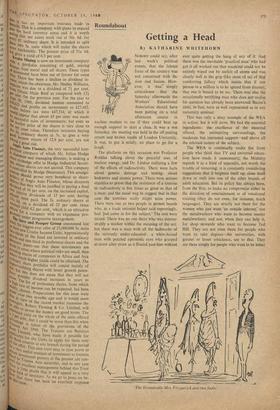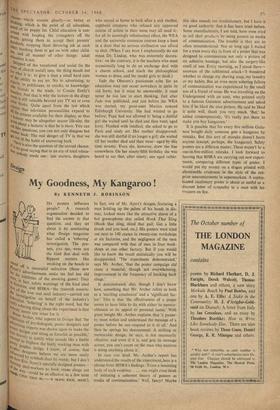Roundabout
Getting a Head
By KATHARINE WHITEHORN NOBODY could say, after last week's political events, that the labour force of the country was not concerned with fis- The platform on this occasion was Professor Rotblat talking about the peaceful uses of nuclear energy, and Dr. Lindop outlining a few of the effects of radioactivity. There were facts about genetic damage and testing; about leukaemia and atomic power. There were serious statistics to prove that the resistance of a tortoise to radioactivity is five times as great as that of a man; and the usual wag to suggest that in that case the tortoises really might seize power. There were one or two people in protest beards who, as a trade unionist helper said reprovingly, had 'just come in for the subject.' The rest were mixed. There was no one there who was demon- strably a worker within the meaning of the act; but there was a man with all the hallmarks of the seriously under-educated: a white-haired man with puzzled optimistic eyes who grasped at straw after straw as it floated past him without ever quite getting the hang of any of it. And there was the inevitable 'practical man' who had got it all worked out that mankind could not be entirely wiped out by surfeit of atoms and was clearly well in the grip (like most of us) of that comforting fallacy which insists that if one person in a million is to be spared from disaster, that one is bound to be me. There was also the occasionally terrifying man who does not realise his question has already been answered. Bacon's idols, in fact, were as well represented as in any university seminar.
This was only a stray example of the WEA in action; but it will serve. We had the essential ingredients: the excellence of the material offered, the uninspiring surroundings, the moderate but interested support—and above all the relevant nature of the subject.
The WEA is continually under fire from people who think that TV and universal educa- tion have made it unnecessary; the Ministry regards it as a kind of appendix, not worth the trouble of removing; it is constantly considering suggestions that it brighten itself up, close itself down or melt into one of the other brands of adult education. But its policy has always been, from the first, to make no compromise either in the direction of entertainment or of vocational training (they do not even, for instance, teach languages). They are strictly not there for the women who just want 'an outside interest,' nor the metalworkers who want to become master metalworkers; and not, when they can help it, for shop stewards who want to become Ted Hill. They are not even there for people who want to take degrees—the universities, with greater or lesser reluctance, see to that. They are there simply for people who want to be better
'The Honourable Mrs. Fitzpatrick and two fools.'
eilizens—which sounds ghastly—or better at thinking, Which is the point of all education, h 'ared of its puppy fat. Child education is con- cerned with keeping the youngsters off the 81a, ee.". getting them to accept their parents' ndards, stopping them throwing ink at each °tiler, teaching them to get on with other child- ren, and all manner of other things: adult education is not. ,StriPned of the vocational and social (in the rlse of church social) uses, the thing stands out 07 what it is: to give a man a small hard core e the ability to say no. No to advertising, to x,_13,erts, to politicians, to crooks, to knowledge- huie friends in the trade, to Cousin Emily's 0,,,Ilehes. And that is why the lecture in the dingy in'1O is still valuable beyond any TV set or even enc)s. t. books. Quite apart from the law which hirins that television personalities expand to lecturer the screens available for their display, so that .00i may be altogether nearer life-size, the ask him about a lecturer is that he is there. You can answer him queions, you can not only disagree but Wer back. st The real danger of TV is that we get 1.?Ilt of the habit of answering back. It ,mere ere is also the question of the second chance. tinntl° good saying that in an era of total educa- nobody needs one: late starters, daughters who stayed at home to look after a sick mother, stubborn creatures who refused any approved course of action in their teens may all need it: for all its seemingly infinitesimal effect, the WEA and the university extension courses keep a boot in a door that no serious civilisation can afford to shut. (When I say boot I emphatically do not mean Dr. Lindop, who was extremely decora- tive: on the contrary, it is the teachers who must occasionally long to do an exchange deal with a charm school, and teach the philosophical women to dress, and the model girls to think.) Jude the Obscure's passionate ache for an education may not occur nowadays in quite its old form; but it must be answerable; it must never be too late to start thinking. Just after Jude was published, and just before the WEA was started, my great-aunt Marion entered Edinburgh University. She had wanted to go before; Papa had not allowed it; being a dutiful girl she waited until he died and then went, aged forty. Flushed with intellect, she asked to go to Paris and study art. Her mother disapproved; she was still dutiful if no longer a girl; she waited till her mother died and then went—aged by this time seventy. Even she, however, drew the line somewhere. On her ninety-fifth birthday she was heard to say that, after ninety, one aged rather.







































 Previous page
Previous page